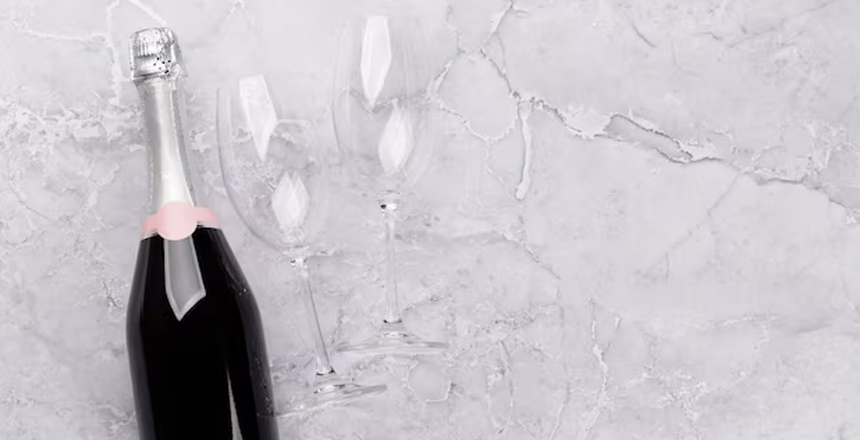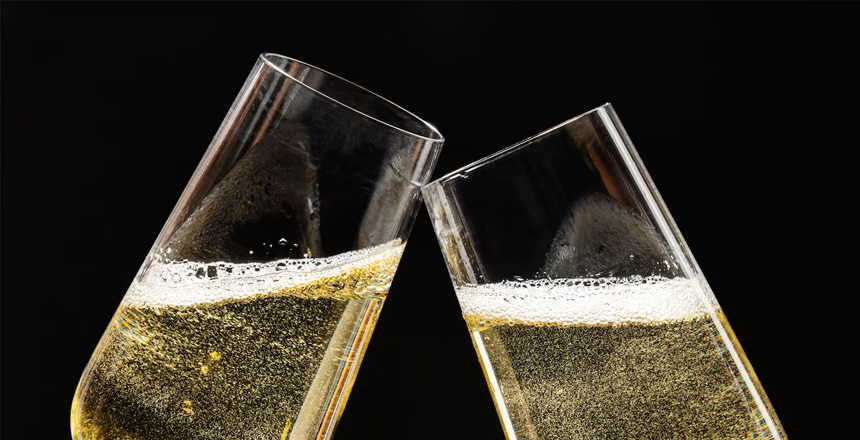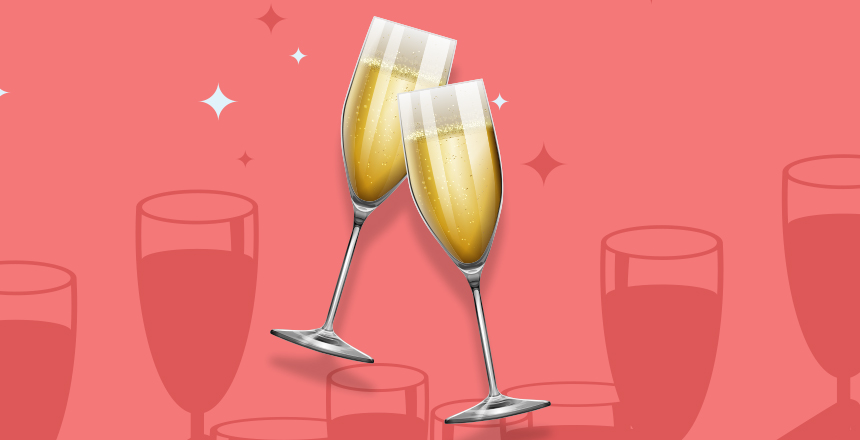One of the best things in life is when you’re able to make a special moment last. Whether it’s celebrating a huge achievement or simply having fun with friends and family – popping open that bottle of bubbly can create an atmosphere that instantly brings smiles and joy.
But the million-dollar question is: how long does Champagne last after opening? Read on to discover why properly storing your newly opened bottle (or container) will help keep its fizziness alive for just as long as your memories from the night!
How Long can Unopened Champagne Last?

Champagne is a celebratory drink that many people keep in their homes for special occasions. But what happens when the bottle is left untouched for too long? It is important to understand how long unopened champagne can last and what factors can affect its shelf life.
Storage conditions that can affect shelf life
1. Temperature – Champagne should be stored in a cool, dark place (ideally 8-10°C). Extreme temperatures can damage the integrity of the bottle and the taste of its contents.
2. Light – Sunlight and other forms of light can affect the taste and quality of your champagne over time. Make sure to store your champagne away from direct light.
3. Humidity – Keeping champagne in a humidity-controlled environment can help maintain its freshness. High levels of moisture can damage the cork and cause contamination.
Signs of spoilage in unopened champagne
If unopened champagne is left in conditions that are not ideal, it can spoil quicker. Some signs of spoilage include:
- Discoloration: If the champagne has become cloudy, has a brownish tint, or contains sediment, it may have gone bad.
- Foul odor: A musty or moldy smell, or a strong sulfur odor, can indicate that the champagne has spoiled.
- Flat taste: If the champagne has lost its characteristic effervescence, it may be past its prime.
- Damaged seal: A damaged or compromised cork or capsule can allow air to enter the bottle, leading to spoilage.
- Low fill level: If the champagne appears to be lower in the bottle than it should be, it may have leaked or evaporated due to a faulty seal or storage conditions.
Under ideal conditions, unopened bottles of champagne can last for up to two years, with vintage varieties lasting longer. However, it is generally recommended that champagne be consumed within 1-2 years for optimal flavor and quality.
How Long can Opened Champagne Last?

Once opened, champagne will typically last for 1-3 days if stored properly in the refrigerator with an airtight stopper or cork.
The shelf life of opened champagne can vary depending on factors such as the type of champagne, storage conditions, and how much air has been let into the bottle.
The carbonation and flavors of champagne can start to degrade once the bottle has been opened, resulting in a flat or stale taste.
To help prolong the life of opened champagne, it is recommended to use a champagne stopper or cork to minimize the amount of air in the bottle, store it in the refrigerator, and consume it as soon as possible.
It’s important to note that while champagne may still be safe to consume after a few days of being opened, it may not taste as fresh or bubbly as when it was first opened.
How The Region and Vintage Can Impact Champagne Shelf Life?
Champagne is not just a drink, it’s a celebration in a bottle. But did you know that the region and vintage of a champagne greatly impact its shelf life?
The champagne region, located in northeastern France, is known for producing quality bubbly due to its unique terroir. Champagnes from this region tend to age better due to their high acidity and lower alcohol content.
On the other hand, champagne from other regions may not have the same longevity due to variations in climate and soil. As for vintage, champagne made in exceptional years tend to age better than those made in subpar years.
The longer a bottle of champagne has aged, the more complex and prized its flavors become. So next time you pop open a bottle of bubbly, take note of its region and vintage – it just might make a difference in how long it will last.
For more information on the relation of champagne and regional factors, click here.
How to Better Store Your Champagne?
Proper storage of champagne is important to maximize its shelf life and maintain its quality. Here are some of our suggestions:
Keep the champagne in a cool, dark place:
Champagne should be stored away from direct sunlight and heat sources. Ideally, it should be kept in a cool, dark place with a consistent temperature between 45 and 60 degrees Fahrenheit.
Store the champagne horizontally:
Champagne should be stored horizontally to keep the cork moist and prevent it from drying out. A dry cork can allow air into the bottle, which can cause the champagne to spoil.
Use a wine fridge or cellar:
If you plan on storing champagne for an extended period of time, consider investing in a wine fridge or cellar. These appliances are designed to maintain a consistent temperature and humidity level, which can help preserve the quality of the wine.
Avoid storing champagne in the kitchen:
The kitchen can be one of the worst places to store champagne because it is often exposed to heat and light. Additionally, the vibrations from appliances like the refrigerator or dishwasher can disturb the sediment in the bottle and affect the taste.
Keep the bottle away from strong odors:
Champagne can easily absorb strong odors from its surroundings, which can impact the flavor and aroma of the wine. Avoid storing champagne near strong-smelling foods or products, such as onions, garlic, or cleaning supplies.
By following these guidelines for proper champagne storage, you can help ensure that your bottle of bubbly stays fresh and delicious for as long as possible.
FAQs
Does the type of champagne affect its shelf life?
Yes, the type of champagne can affect its shelf life. Sparkling wines made with different grape varieties and aging techniques will have different shelf lives. Additionally, some sparkling wines are bottled with added sugars or sweeteners that may affect their longevity as well.
Can you extend the shelf life of champagne by storing it in a particular way?
Yes, storing champagne in a cool and dark place, such as a refrigerator or wine cellar can help to extend its shelf life.
Additionally, sparkling wines should always be stored on their sides so that the cork remains moist and prevents air from entering the bottle. This helps to keep the bubbly fresh for longer.
Can you still drink champagne after its expiration date?
Yes, you can still drink champagne after its expiration date but it may not taste as fresh. The quality of the sparkling wine will start to deteriorate over time and eventually become unpleasant to drink.
How can you tell if champagne has gone bad?
A good indication that champagne has gone bad is if there is a distinct odor or taste of vinegar. Additionally, the cork may have become soft and spongy, which will also be a sign that the sparkling wine has gone off.
Can you store opened champagne for later consumption?
Yes, you can store opened champagne for later consumption as long as it is properly sealed and stored in a cool, dark place away from direct sunlight. However, the quality of the sparkling wine will start to deteriorate over time so it’s best to consume it within a few days after opening.
How does storing champagne in the refrigerator versus in a wine cellar affect its shelf life?
Storing champagne in the refrigerator can help to extend its shelf life compared to storing it in a wine cellar. The cooler temperatures of a refrigerator slow down the oxidation process, which helps keep the champagne fresh for longer.
However, the ideal temperature for storing sparkling wines is somewhere between 41-50°F (5-10°C). Storing the champagne in a wine cellar at this temperature can help to further extend its shelf life.
Take Home Message
As we saw, when stored correctly and properly preserved, champagne can be enjoyed for a long time. It’s always a great idea to consider the best way to store your champagne in order to get the most value out of it, whether it’s weeks, months or years down the line.
While there are so many things that bring us together during times of celebration, nothing compares to opening up a bottle of champagne with friends and family.
No matter what kind of occasion you’re celebrating, sparkling wine will make any moment last with its delicious taste, energizing bubbles and elegant appearance. Keep these tips in mind while planning your next event: How long does champagne last? Make the moment last!


